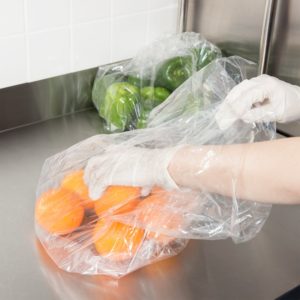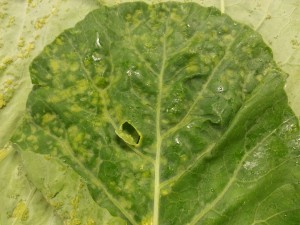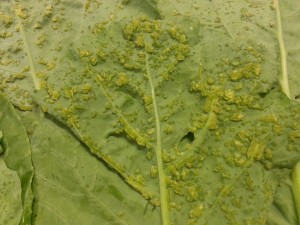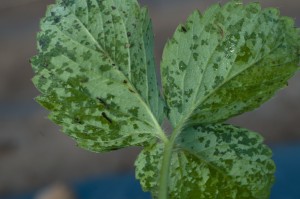Vegetable Crops Edition
Seasonal updates and alerts on insects, diseases, and weeds impacting vegetable crops. New Jersey Commercial Vegetable Production Recommendations updates between annual publication issues are included.
Subscriptions are available via EMAIL and RSS.
Quick Links:
 NJ Commercial Vegetable Production Recommendations
NJ Commercial Vegetable Production Recommendations
 Rutgers Weather Forecasting - Meteorological Information important to commercial agriculture.
Rutgers Weather Forecasting - Meteorological Information important to commercial agriculture.
New Requirements for Continued Registration of Paraquat
Pesticide Storage Inventory Due May 1st: Download Rutgers Templates
Marketing Tip: Consider Pre-Bagging Produce at Farm Markets
By, Michelle Infante-Casella and Meredith Melendez, Agricultural Agents
Farm marketers can learn from recent behaviors observed in supermarkets and other food outlets as we start the produce season in New Jersey. Besides facilitating social distancing and having employees and customers wear masks and other protective gear, farm owners and workers can help ease shopping anxiety by pre-bagging items.
To date there is no scientific evidence to support the transmission of COVID-19 through food, but customer buying patterns have shown that packaged produce is selling better than loose produce. Customers are fearful of virus transmission from many different sources regardless of the science. Most people are very suspicious when touching every object around them whether it be door handles, shopping carts, checkout counters, credit card machines and also on the list – loose fruits and vegetables on shelves that may have been handled by other people. These fears are certainly understandable.
Some food stores are reporting bagged items are selling faster than loose items. The public sentiment is wrapped produce has a barrier that acts as a safety measure against contamination. Produce items in pre-packaged containers, such as bagged lettuces, bagged broccoli, bagged cucumbers, bagged peppers, packaged tomatoes and other items wrapped in plastic have increased in sales over their unpackaged counterparts. In addition, items in highest demand tend to be more shelf-stable produce like potatoes, apples, onions, unpeeled carrots, winter squashes and cabbage.
The media has been publicizing milk dumping from tanker trucks, in-season produce fields being plowed, and issues with food distribution across the country due to issues from COVID-19. Consumers are questioning many issues right now. Is the U.S. food supply safe? Will there be enough food to go around? Will the food stores be closing? Is it safe to buy fresh produce? Should I worry when I see empty store shelves?
To ensure a domestic food supply in the future, it is more important than ever for customers to buy local and US farm products. This is a message the entire agriculture industry can share with the public.
Some questions about food and COVID-19 can be answered by reading the U.S. Food & Drug Administration’s website https://www.fda.gov/food. This is also a good site to send your customers to help answer their questions. Resources specific for the agricultural community are listed on the Rutgers On-Farm Food Safety COVID-19 website.
In summary, farm market proprietors may want to keep produce displays well stocked with plenty of bagged and packaged produce items. This will also help facilitate having customers in the market for shorter periods. Customers can just pick up bags and go rather than pick through a pile and taking extra time to bag their own items. In addition, pricing bags ahead of time, that don’t need to be weighed, can also quicken check out times. Shoppers are in a hurry to get in and out of stores to ease fears of potential virus transmission. Making it as easy as possible to help facilitate shopping and check out may go a long way to lessen customer anxiety in current times. Keep engaged with customers for suggestions on what they may need from your market.
Farmers and farm markets will be playing a major role in food distribution and food security in the near future and beyond. Thank you to all farmers, farm workers, and other essential workers in this time of crisis.
TONIGHT – Spanish-language Training for Farmworkers and Farmers on Coronavirus
The Cornell Farmworker Program and the Finger Lakes Community Health Clinic will be hosting a webinar and Q and A, in Spanish, for farm workers and farmers. Dr. Canario, Medical Director of Finger Lakes Community Health will discuss the coronavirus, what it is, how to protect oneself, and what one should do now. He will also respond to questions submitted in advance. Mary Jo Dudley, Cornell Farmworker Program will moderate the session.
Farm employers are encouraged to share this with Spanish-speaking employees, and consider hosting a farm meeting since this will be broadcasted via Zoom.
Time: Monday, April 13, 2020 at 6:30 PM.
To register and submit questions, please visit: https://docs.google.com/forms/d/e/1FAIpQLScsocEZCwGgIiGi3V2X-d0Ws_Zq78k5XSeSqGVbIReE13Jw9w/viewform?vc=0&c=0&w=1
El Programa de Apoyo a los Trabajadores Agrícolas de la Universidad de Cornell y
Finger Lakes Community Health (la clínica) invita cordialmente a los trabajadores agrícolas a una llamada gratuita con el Doctor José Canario.
“Los trabajadores agrícolas y el coronavirus: Lo que debe saber y lo que puede hacer ahora”
Doctor José Canario, Director de Medicina del Finger Lakes Community Health explicara el coronavirus y responderá a sus preguntas.
Por favor invite a sus compañeros de trabajo y familiares. La llamada será moderada por Mary Jo Dudley, Programa de Apoyo a los Trabajadores Agrícolas.
Lunes, Abril 13, 2020
6:30 PM
Clic aquí para registrarse y enviar sus preguntas
Edema development in brassica crops
Edema is often expressed as off-color swellings or galls that appear on leaves and stems. Edema develops when epidermal cells hold excessive water due to a slowing of evapotransporation when hot, muggy days are followed by cooler, wetter weather. Edema develops because the plant takes in more water (due to a high soil moisture contant) faster than it can get rid of it through evapotranspiration causing cells to rupture which results in the blistering of the leaves. Edema is strictly caused by environmental factors and can appear whenever these conditions are met. Properly monitor soil conditions, irrigation cycles, and the weather to avoid over irrigating on warm, hot early spring days, especially when quick cold fronts/temperature drops and cloudy weather are expected.

Symptoms of edema on top side of
collard leaf.
Note the off-color appearance of leaf surface.

Edema, bottom side of collard leaf.
Note irregular, “corky” appearance due to leaf cell rupture.
Understanding and controlling angular leaf spot in strawberries
Often considered a minor pathogen, angular leaf spot caused by the bacterium, Xanthomonas fragariae, can cause serious leaf and calyx infections ruining the marketability of fruit if left uncontrolled. Like all bacterium, the pathogen will infect leaves and the calyx through natural openings or wounds. Primary infections of new growth in the spring originate from systemically infected overwintered plants and dead leaves in which the bacterium survives the winter; or from infested transplants. The pathogen is very resistant to desiccation and can survive in old, dried leaves or infected plant debris buried in the soil. The pathogen will not survive free in the soil so it originates primarily from infected leaf debris and infected crowns.

Fig. 1. Water-soaked lesions caused by angular leaf spot on infect strawberry leaf. Photo by P. Nitzsche
Infections can often start in production operations and come in on infected bare root transplants or cuttings. Symptoms on leaves include initial small, irregular water-soaked lesions (Fig. 1). Young, actively growing leaves are most susceptible, especially on vigorously growing plants. Disease development is favored by moderate to low daytime temperatures, low night time temperatures – near or below freezing, and high relative humidity. Long periods of precipitation, overhead irrigation used to establish plantings or protect plantings from freezing, and heavy dews favor disease development.
[Read more…]
